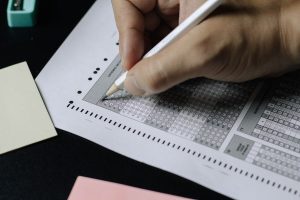TL;DR:
- Students forget most of what they “learn” in school.
- Acknowledging this gives us the freedom to focus on powerful learning experiences.
- Wrestling with the impermanence of some school “learning” challenges our core values as educators.
What is Learning, Really?
Educational thought leader Will Richardson loves to invite teachers to share their definitions of learning. His observation: most of us have a great deal of difficulty offering a specific definition. It’s a shocking revelation considering it is our core mission.
So here is the uncomfortable truth about school: most middle and high school students don’t truly learn most of the things they are exposed to in school.
It’s self-evident if we really think about it. On the very day when students have most carefully prepared to demonstrate what they have learned, most students don’t know some of the material. A student who doesn’t know 15% of the answers gets a B. A student who doesn’t know 40% may get a passing grade.
That is at a student’s peak moment of knowing. And it’s all downhill from there. Clearly, much of what we call learning lacks permanence.
An Embarrassing Teaching Moment 
I’ll illustrate with an embarrassing anecdote from my first year of teaching. As I was waiting for students to clear their desks in preparation for a test, one student exclaimed, “Quick Mr. Shapiro. Pass it out before I forget this stuff.” I felt my face flush.
“Fine,” I thought. “If your learning is so transient, I’ll just hold off for five minutes because you don’t deserve a good grade for things you have learned so impermanently.”
Later that night, when my heart rate had returned to normal, it dawned on me that I needed to look at myself rather than at the student. After all, I was the one that created a classroom culture that valued such shallow “learning.” By my third year of teaching, I had abandoned traditional tests as an assessment tool; I didn’t ask students a single multiple-choice question during my final 29 years of teaching.
An Unsettling Thought Experiment
I know most of our assessments in secondary schools still revolve around tests. And that brings us back to the question of learning. Consider the following thought experiment: what if, without notice, we asked all students to spend a random school day going through their schedule from last year, and in each class, the teacher gave students a test they had taken the previous year?
What if, without notice, we asked all students to spend a random school day going through their schedule from last year, and in each class, the teacher gave students a test they had taken the previous year? Share on X
How would most teachers feel about this experiment? A common reaction might be defensiveness. A more productive reaction would be curiosity. As a teacher, it would be interesting to know what students still remember a year down the road.
I suspect we already know the answer: far less than the day they took the test.
If we asked adults to take the tests we had taken in high school, most of us would fail them spectacularly. Is anyone for Algebra II? Want to retake that Progressive Era test from eleventh grade? How about your unit test on British poetry? I wouldn’t stand a chance on a chemistry test.
An Opportunity
So what should we conclude? Is this an accusation? An indictment? A critique?
I’d suggest it’s something totally different. It’s an opportunity. An invitation. A liberation!
How so? Well, if most of what we’re teaching and assessing in schools doesn’t produce long-lasting learning, perhaps we don’t need to labor under the weight of a bloated curriculum. If kids are going to forget most of it anyway, maybe we can dig deeper into the most essential elements in our curricula. Perhaps we can focus more on enduring, conceptual understandings and less on ephemeral details. Perhaps we can center our assessment practices around helping students develop transferable skills they will utilize and build upon in their lives outside of academia.
After all, most of us never answer a multiple-choice question once we finish school.
If most of what we’re teaching and assessing in schools doesn’t produce long-lasting learning, perhaps we don’t need to labor under the weight of a bloated curriculum. Share on XA Lesson from 31 Years in the Classroom
I occasionally get a Facebook message from a former student I taught more than two decades ago. These thirty and forty-year-old people describe something they learned in my class that they’ll never forget. The learnings almost always share three commonalities:

1) They are conceptual in nature.
2) They were the product of experiential learning pedagogy.
3) They caused students to understand something in a profound new way that they permanently integrated into their worldview.
Because I entered the profession before it was overtaken by standardized testing, it was easier to make these types of experiential learning opportunities the focus of my classes. I endeavored to hit those conceptual home runs as often as I could.
Unfortunately, the reforms of the last twenty-five years have been rooted in standardizing and over-testing the “learning” experience. The educational landscape is littered with state tests, state standards, short-cycle assessments, common assessments, and AP courses with high-stakes year-end tests. Each of these “improvements” has chipped away at teachers’ independence, creativity, self-determination, and professional judgment. They often force great teachers to abandon what they know about deep, engaging, permanent learning. They can produce an unfortunate “teaching to the test” mentality that yields shallow, transient, or narrow “learning.”
[scroll down to keep reading]A Powerful Test of Teachers’ Deepest Values
Teachers in modern American schools often must choose between “covering the curriculum” and creating powerful, enduring learning experiences for our students. Although some may argue that they’re not mutually exclusive, I’m pretty confident they are.
If kids don’t truly learn most of the things they are exposed to in school, teachers face an important set of choices. These choices summon our courage and our wisdom. They call us to question the deep motivations that brought us to the profession.
Perhaps we should plan our courses by posing the question that James Lang, the Director of the Center for Teaching Excellence at Assumption University, asks in his insightful article: What Will Students Remember From Your Class in 20 Years?
It is there that we might find the ultimate answer to the question, “What is learning?”




